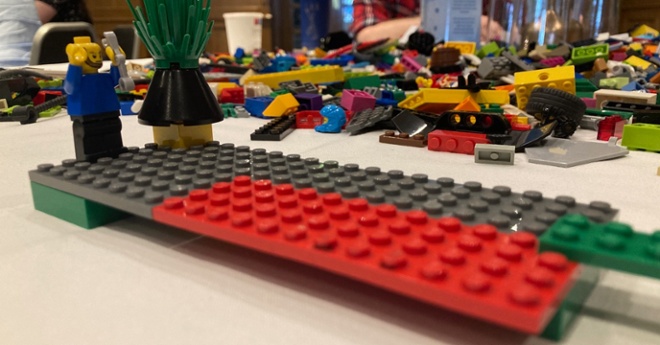Share this
Reflecting on #BIALL2023: Gaining the tech edge and being prepared for change
July 5, 2023

An example from the session "Lego® Serious Play® and student learning; let them build it and they will come to their own conclusions"
Don’t panic - let’s talk calmly about tech! For the sake of our firms, colleagues and careers we need to understand the potential impact and implications of emerging (emerged?) technologies such as generative AI. With that in mind, it’s time to digest the many insights presented at BIALL 2023.
In keeping with the theme of "Gaining the Edge: Investing in Our Skillset", the conference - as usual - proved to be a treasure trove of useful knowledge. This post explores three key discussion areas: the rise of ChatGPT, the need for bridging knowledge gaps between law schools and law firms, and strategies to encourage people to embrace change. (Lego® bricks optional!)
Unpacking the Generative AI hype
The standout session was “Let’s chat about ChatGPT” given by Robin Chesterman. The influence of OpenAI's tech on how we work and live cannot be ignored. Last year, we would never have dreamed about a plenary session like this! However, with 100 million users signing up since its launch in November 2022, we have to ask ourselves how did we get here? What is going on with the tech?
ChatGPT is an advanced predictive text autocomplete machine. It determines the most reasonable continuation of a sentence based on patterns it has learned from vast amounts of data. You can find out more about ChatGPT here and how it’s evolving here. It's crucial to note that ChatGPT, like the other AI models, doesn't understand the language it generates. It is both shockingly smart and shockingly stupid!
It mimics patterns in language, producing text that resembles its training data. For example, this random sentence generated from a Jane Austen trigram model cited in this research document made me laugh,
“You are uniformly charming!” cried he, with a smile of associating and now and then I bowed and they perceived a chaise and four to wish for.”
This is a quote which is both smart and stupid. As Robin summarised, “large language models are good at saying what an answer should sound like, which is different from what an answer should be”.
This raises questions about its reliability, particularly in relation to legal research which requires current, accurate, and authoritative information. There are also issues around the need for more transparency and the inability to reverse engineer or fully comprehend these AI models and the text they produce.
Some lawyers have never heard of ChatGPT!
The tech is hard to grasp but we need to understand as much as possible for the sake of our end users - and society at large. Astonishingly, one commentator wrote, "some lawyers tell me they have never heard of ChatGPT”. I find this level of ignorance shocking - everyone should be signed up for some kind of tech newsletter!
From dangerous ignorance to the hazards of a small amount of knowledge…
We all know the recent US court case where attorneys were fined for citing non-existent cases. As highlighted in the article above, the lesson we should take away is not “do not use ChatGPT” but rather, do your research properly! I have a feeling that these people would still prefer Wiki over Westlaw, regardless of what their information department recommends.
So how do we give our legal professionals the best start?
The "Mind the Gap" plenary session delved into the chasm that often separates the theoretical knowledge gained at law school and the practical necessities of operating within a law firm. Law firms and law schools work hard to ensure that graduating students transition smoothly into their professional roles. However, the rapidly evolving landscape of legal technology presents unique challenges in aligning academic curricula with real-world requirements.
The key lies in fostering communication and collaboration between different stakeholders. Library information staff at law firms need to engage with university information personnel, lecturers and department heads, as well as law firm supervisors. Top tips from professional support lawyers and feedback from former trainees can provide invaluable insights for improvement.
Addressing this issue requires an agile approach to education and training. We should encourage our trainees to learn, question, and reflect on how they can better align their learning with the demands of the profession. This involves engaging them through surveys, discussions, and direct interaction. It's about exchanging ideas, refining training approaches, and striving to understand the trainee experience.
Encouraging the adoption of new technology
The swift progress of AI technology in the legal sector might have caught many by surprise, but it presents an unprecedented opportunity for library and information people to make an impact. Law librarians and information professionals must refine their skills, maintain their relevance, and facilitate effective change management.
The third plenary session got us thinking about change and how we manage it. Change is scary and people tend to stick to what they know but in a work environment that can be a disadvantage. Dr Phillippa Lally took us through her fascinating scientific research.
She outlined several strategies to encourage everyone to embrace change.
- Environmental changes: Remove choices that might distract or confuse your users
- Ensure proximity: Make sure new systems are immediately visible and close to hand
- Make it customisable: Personalise as much as you can and ensure the user's preferred options are preselected
Vable has recently written about how we can ensure successful tech implementation projects and this advice complements what I wrote there. In the face of rapidly evolving tech, embracing change and adapting to new ways of working is vital. By understanding the mechanisms of habit formation and leveraging them to reduce 'friction', we can guide users to make the most of new technologies.
Beyond BIALL 2023: The learning continues
I’m always inspired after a conference but this one was particularly good. The rapid pace of technological development and its implications for our field necessitates continuous learning and evolution - I find this super-exciting. I'm thrilled to be working with innovative individuals within Vable and the wider information community. See you at a conference very soon!
Share this
- February 2026 (1)
- January 2026 (2)
- December 2025 (2)
- November 2025 (2)
- October 2025 (3)
- September 2025 (2)
- August 2025 (2)
- July 2025 (4)
- June 2025 (3)
- May 2025 (2)
- April 2025 (1)
- March 2025 (1)
- October 2024 (1)
- July 2024 (1)
- June 2024 (2)
- May 2024 (2)
- April 2024 (3)
- March 2024 (3)
- February 2024 (4)
- January 2024 (2)
- December 2023 (1)
- November 2023 (2)
- October 2023 (2)
- September 2023 (1)
- August 2023 (3)
- July 2023 (5)
- June 2023 (2)
- May 2023 (2)
- April 2023 (4)
- March 2023 (1)
- February 2023 (1)
- January 2023 (2)
- November 2022 (2)
- September 2022 (2)
- August 2022 (2)
- July 2022 (1)
- June 2022 (1)
- May 2022 (2)
- April 2022 (3)
- March 2022 (1)
- February 2022 (2)
- December 2021 (2)
- November 2021 (2)
- October 2021 (2)
- September 2021 (2)
- August 2021 (2)
- July 2021 (2)
- June 2021 (2)
- May 2021 (1)
- April 2021 (2)
- March 2021 (1)
- February 2021 (3)
- January 2021 (2)
- November 2020 (3)
- October 2020 (1)
- August 2020 (2)
- July 2020 (4)
- June 2020 (1)
- May 2020 (1)
- April 2020 (2)
- March 2020 (2)
- February 2020 (3)
- January 2020 (1)
- December 2019 (2)
- November 2019 (1)
- October 2019 (1)
- September 2019 (1)
- August 2019 (3)
- July 2019 (3)
- June 2019 (3)
- May 2019 (2)
- April 2019 (1)
- March 2019 (2)
- February 2019 (3)
- January 2019 (3)
- December 2018 (1)
- November 2018 (2)
- October 2018 (2)
- September 2018 (1)
- August 2018 (2)
- July 2018 (1)
- June 2018 (2)
- May 2018 (3)
- April 2018 (3)
- March 2018 (1)
- February 2018 (3)
- January 2018 (1)
- November 2017 (1)
- October 2017 (1)
- July 2017 (1)
- April 2017 (2)
- March 2017 (3)
- February 2017 (1)
- January 2017 (1)
- November 2016 (2)
- October 2016 (1)
- September 2016 (1)
- August 2016 (2)
- June 2016 (1)
- May 2016 (1)
- April 2016 (1)


